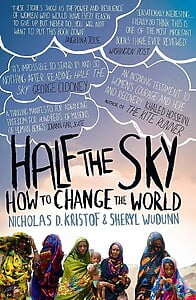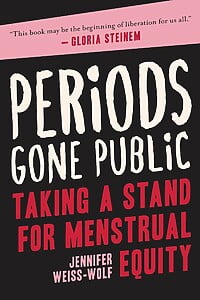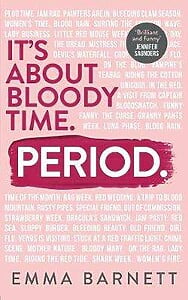There are many great books authored on women’s rights, female oppression and equality.
The Unfinished Revolution: Voices from the Global Fight for Women’s Rights by Minky Warden, The Future of Feminism by Sylvia Walby, Modern Women in China and Japan: Gender, Feminism and Global Modernity Between the Wars by Katrina Gulliver, and Gender, Agency and Political Violence: Rethinking Political Violence by Linda Åhäll and Laura J. Shepherd are just a minuscule selection of literature to check out for those interesting in books on women’s rights and female equality.
There have also been some excellent period poverty books. Here are 3 of the most influential, important and well-known books on period poverty and the many subjects and issues that surround it.
Half The Sky – Nicholas D. Kristof and Sheryl WuDunn

This is an in-depth account of many forms of female oppression interwoven with powerful but touching real-life stories of women prevailing against the most brutal forms of adversity.
Husband and wife authors Nicholas D. Kristof and Sheryl WuDunn published Half the Sky in 2009 and it’s come to be one of the most authoritative and influential works on the oppression of women worldwide, but particularly in developing countries.
Nicholas Kristof, a Pulitzer-prize winning journalist, actually purchased two prostitutes during the writing of this book to then set them free at a safe village with the assistance of a charity.
Though it may sound extreme, this is indicative of the lengths the authors went to when investigating oppressed women during the writing of Half the Sky.
Half the Sky explores the dualities of women’s oppression, how even in the most unfavourable and tragic of circumstances, the immense perseverance of women turns their oppression into opportunity. The book is stark and explicit in its description of trauma. It embarks on a journey through the experience of a Cambodian teenager Srey Rath who was sex trafficked in South East Asia, then drawing attention to how these experiences are replicated for women all over the world – they are not as uncommon as we’d like to think.
By identifying techniques and methods of oppression ranging from trafficking to rape, prostitution and honour killings, the authors draw attention to how oppression against girls and women is diverse, reinforced by society and often calculated. They also explore some of the methods and motivation behind these oppressive behaviours as embedded in traditional, cultural or religious beliefs.
Gender divisions are often highlighted by how many issues that face women are described as ‘women’s issues’ so as to remove them from the moral agenda of all humans, segregating the causes of females from that of the mainstream political agenda. In its exploration of cross-cultural forms of violence, Half the Sky touches on colonialism, religious oppression, patriarchal oppression and also the nature of the news and the male-led media. Noting how the media quickly cycles through its attention to fleeting areas of concern, Half the Sky argues that it is not fit to do moral justice for women and girls.
It is not simply a study and evaluation of trauma, though, but also builds a detailed picture of how women have overcome great tragedy to succeed in magnificent ways.
There are many examples here, like Sunitha Krishnan, an Indian woman to set up a school in Hyderabad to help women escape prostitution, and Mukhtar Mai, who was gang-raped in Punjab and expected to commit suicide, but instead went to the police and set up a school using here compensation money.
The intended message is that we must all discover greater human conviction when tackling women’s rights – this is a global moral crisis that we must tackle together. Whilst fighting against forms of oppression in their rawest form is the priority, Half the Sky also states that education and micro finance provide a path forward to lift women from tragic environments.
Periods Gone Public – Jennifer Weiss-Wolf

Author and activist Jennifer Weiss-Wolf’s Periods Gone Public explores how and why women worldwide have spurred on a drive towards menstrual equality. It evaluates the root causes and historic premise of taboo, and also the current state of affairs surrounding menstrual activism.
A good deal of the book is about tampon tax, menstrual activism and period equity, and how eliminating taxes across the world has helped ignite global movements to improve period equity and access to proper sanitary products. Weiss-Wolf’s activist approach is thoroughly aimed at normalising menstruation, to no longer commit it to taboo and to embrace the topic clearly and openly for discussion in the public domain.
Periods Gone Public also looks at areas in dire need of work for menstrual equity, such as the homeless, female prisoners or the many others living in period poverty. She outlines the ways we can tackle this together, partly through policy, innovative technology and government but also through grassroots activism.
This is an excellent book that draws upon the ability of women to be heard now more than ever, but it’s not blind to the work that still needs to be done to tackle period poverty around the world.
Period – Emma Barnett

BBC broadcast and author Emma Barnett’s Period is a witty and humorous but sincere account of the female experience. It explores both the mind and body of periods, how women experience them in various ways and how the dialogue surrounding them is peculiar, but changing.
She draws attention to situations like ex-PM Gordon Brown stumbling to say tampon in parliament and a woman who was almost arrested for having bloody bed sheets in a bag. Periods feature in both politics and advertising; big brands promote products on the key tenets that they’re ‘discrete’ and easy to hide, and this contributes to the ongoing closet-dialogue surrounding menstruation.
Many of these investigations illustrate how men are too often unable to engage with menstruation without awkwardness at least, even if not genuine stigma or taboo, though that is often the case. There is a political dynamic here, where male policymakers simply do not think about menstruation as a normal bodily process.
Period turns its attention to period poverty also, and describes the trauma and complexities of women who are unsupported during menstruation, both physically by lack of sanitary products and psychologically through shame and anxiety. Girls miss school, women miss work. Accessibility to a basic product remains so tangibly low even in the developed world, even when menstruating women are everywhere, all around us.
The book also explores some of the health aspects of stigma, not just mentally but physically where shame and doubtfulness lead women to put off reproductive and sexual health issues as they’re often afraid to consult a doctor.
An exceptional all-encompassing book that accurately describes the highs and lows of menstruation, Period is a sincere but witty investigation into how women can tackle menstrual health and period poverty for both themselves and others.
